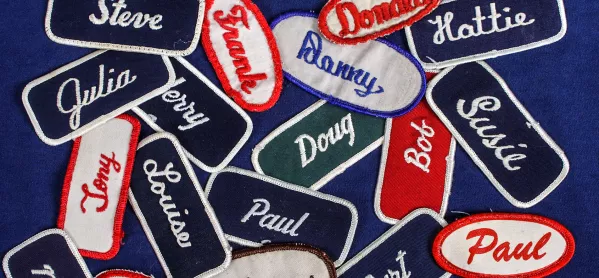What’s in a name? What does your name mean to you? Since embarking on teacher training, this has been high in my thoughts.
It was not only something I wanted to research but also an area where I wanted to see change. Having spoken to many in education - teachers, senior staff, trainee teachers, newly qualified teachers, university staff, parents and others - the question of whether pupils should call teachers by their first name stimulates a lot of discussion. It sounds like a provocation, even, but is it really?
On Twitter I recently shared a post highlighting my passion and called for a change or a choice (and there were so many interesting responses). In 21st-century society, we rarely use a formal address anywhere other than in schools. Yet while the General Teaching Council for Scotland highlights social justice, trust and respect as key to being a teacher in Scotland, names are not mentioned - it is still common practice, or even a rule, that a formal approach to names is used.
What I have learned is that many schools in other countries have already adopted the first-name approach - Italy, Spain, Denmark, Iceland and Germany have been mentioned to me. Teachers from those countries commented that they felt it strange practice to see Scotland’s approach to names, given the generally progressive approach we take to education.
However, using first names is common in the UK in early years establishments. That is understandable: it would be hard for our youngest learners to leave their caregivers and have to use a title and surname, and it would jar with places built on nurture and play, on building trust and relationships. A similar approach to names is taken in some schools for children who have additional or more complex needs.
So what’s in a name? Nothing or everything? A title and a surname is a formal type of address, that is a fact. Some might say schools are formal, that it is a way of showing teachers respect. Through the power of my Twitter, however, I have found that some schools in Scotland are leading the way in all staff using only their first names.
Pupils on first name terms with teachers
This, for me, is personal. Joining the teaching profession as a female student, my title is judged. Am I a “Miss”, “Mrs” or “Ms”? What does that tell others about me, and what is assumed?
I do not go by such a title in any other area of my life. I am “Sarah”, and this does not stop me from being professional, or earning trust and respect for my practice and values. My title and surname do not make me better or represent who I am.
Two key questions. Firstly, does your name and how you are addressed in any way make you a better teacher? Secondly, does it promote a student-teacher relationship where authenticity, integrity and trust are at the heart of the learning?
And, even if there is not wholesale change in how teachers are to be addressed, surely we should have some choice?
Sarah Bradley is a student primary teacher at the University of Strathclyde. She tweets @sarahbradley171





